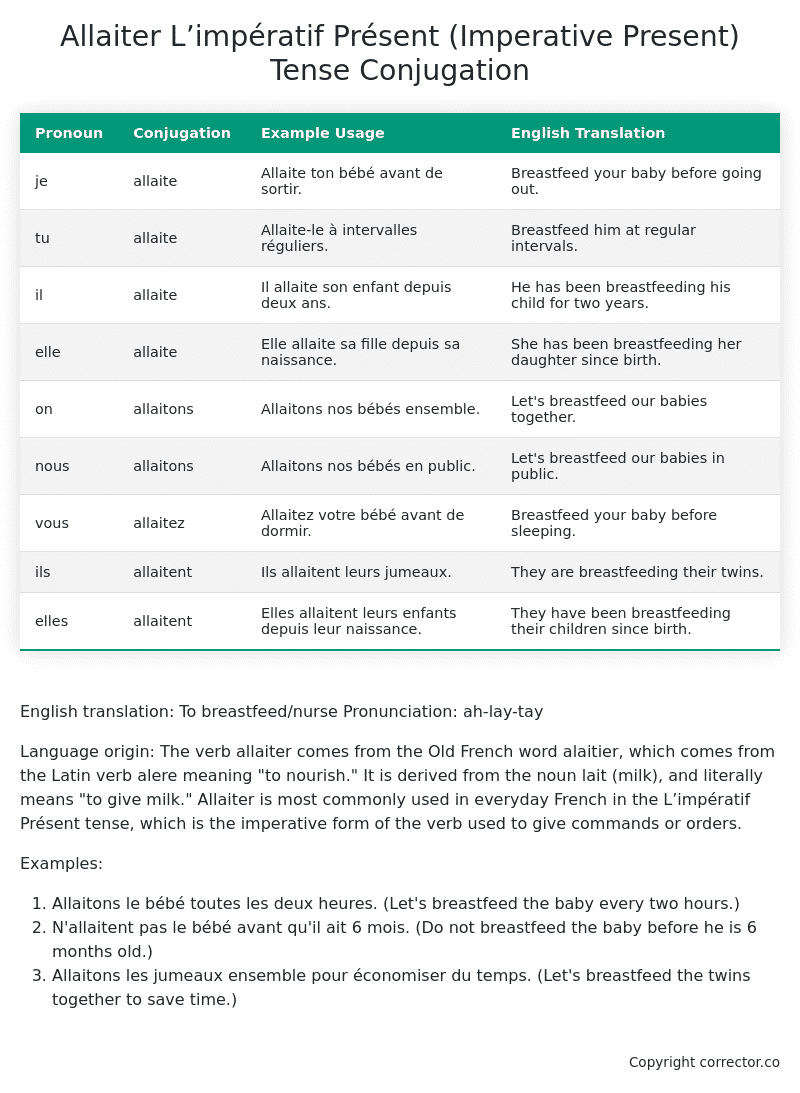L’impératif Présent (Imperative Present) Tense Conjugation of the French Verb allaiter
Introduction to the verb allaiter
English translation: To breastfeed/nurse
Pronunciation: ah-lay-tay
Language origin:
The verb allaiter comes from the Old French word alaitier, which comes from the Latin verb alere meaning “to nourish.” It is derived from the noun lait (milk), and literally means “to give milk.” Allaiter is most commonly used in everyday French in the L’impératif Présent tense, which is the imperative form of the verb used to give commands or orders.
Examples:
- Allaitons le bébé toutes les deux heures. (Let’s breastfeed the baby every two hours.)
- N’allaitent pas le bébé avant qu’il ait 6 mois. (Do not breastfeed the baby before he is 6 months old.)
- Allaitons les jumeaux ensemble pour économiser du temps. (Let’s breastfeed the twins together to save time.)
Table of the L’impératif Présent (Imperative Present) Tense Conjugation of allaiter
| Pronoun | Conjugation | Example Usage | English Translation |
|---|---|---|---|
| je | allaite | Allaite ton bébé avant de sortir. | Breastfeed your baby before going out. |
| tu | allaite | Allaite-le à intervalles réguliers. | Breastfeed him at regular intervals. |
| il | allaite | Il allaite son enfant depuis deux ans. | He has been breastfeeding his child for two years. |
| elle | allaite | Elle allaite sa fille depuis sa naissance. | She has been breastfeeding her daughter since birth. |
| on | allaitons | Allaitons nos bébés ensemble. | Let’s breastfeed our babies together. |
| nous | allaitons | Allaitons nos bébés en public. | Let’s breastfeed our babies in public. |
| vous | allaitez | Allaitez votre bébé avant de dormir. | Breastfeed your baby before sleeping. |
| ils | allaitent | Ils allaitent leurs jumeaux. | They are breastfeeding their twins. |
| elles | allaitent | Elles allaitent leurs enfants depuis leur naissance. | They have been breastfeeding their children since birth. |
Other Conjugations for Allaiter.
Le Present (Present Tense) Conjugation of the French Verb allaiter
Imparfait (Imperfect) Tense Conjugation of the French Verb allaiter
Passé Simple (Simple Past) Tense Conjugation of the French Verb allaiter
Passé Composé (Present Perfect) Tense Conjugation of the French Verb allaiter
Futur Simple (Simple Future) Tense Conjugation of the French Verb allaiter
Futur Proche (Near Future) Tense Conjugation of the French Verb allaiter
Plus-que-parfait (Pluperfect) Tense Conjugation of the French Verb allaiter
Passé Antérieur (Past Anterior) Tense Conjugation of the French Verb allaiter
Futur Antérieur (Future Anterior) Tense Conjugation of the French Verb allaiter
Subjonctif Présent (Subjunctive Present) Tense Conjugation of the French Verb allaiter
Subjonctif Passé (Subjunctive Past) Tense Conjugation of the French Verb allaiter
Subjonctif Imparfait (Subjunctive Imperfect) Tense Conjugation of the French Verb allaiter
Subjonctif Plus-que-parfait (Subjunctive Pluperfect) Tense Conjugation of the French Verb allaiter
Conditionnel Présent (Conditional Present) Tense Conjugation of the French Verb allaiter
Conditionnel Passé (Conditional Past) Tense Conjugation of the French Verb allaiter
L’impératif Présent (Imperative Present) Tense Conjugation of the French Verb allaiter (this article)
L’infinitif Présent (Infinitive Present) Tense Conjugation of the French Verb allaiter
Struggling with French verbs or the language in general? Why not use our free French Grammar Checker – no registration required!
Get a FREE Download Study Sheet of this Conjugation 🔥
Simply right click the image below, click “save image” and get your free reference for the allaiter L’impératif Présent tense conjugation!

Allaiter – About the French L’impératif Présent (Imperative Present) Tense
Usage
Giving commands
Making requests
Offering advice
Expressing desires
Conjugation Formation
Interactions with other tenses
Want More?
I hope you enjoyed this article on the verb allaiter. Still in a learning mood? Check out another TOTALLY random French verb conjugation!


